Oil and Gas Industry Analysis
VerifiedAdded on 2020/01/28
|8
|2563
|43
Literature Review
AI Summary
The assignment delves into the structure and operations of the oil and gas industry, particularly highlighting BP's success factors. It explores the roles and responsibilities of upstream, midstream, and downstream divisions within the firm, emphasizing how they contribute to competitive advantage. Furthermore, the analysis considers environmental and economic factors crucial for BP's success and outlines measures the company takes to support local communities through Corporate Social Responsibility (CSR) activities.
Contribute Materials
Your contribution can guide someone’s learning journey. Share your
documents today.

Introduction to the Oil and
Gas Environment
Gas Environment
Secure Best Marks with AI Grader
Need help grading? Try our AI Grader for instant feedback on your assignments.
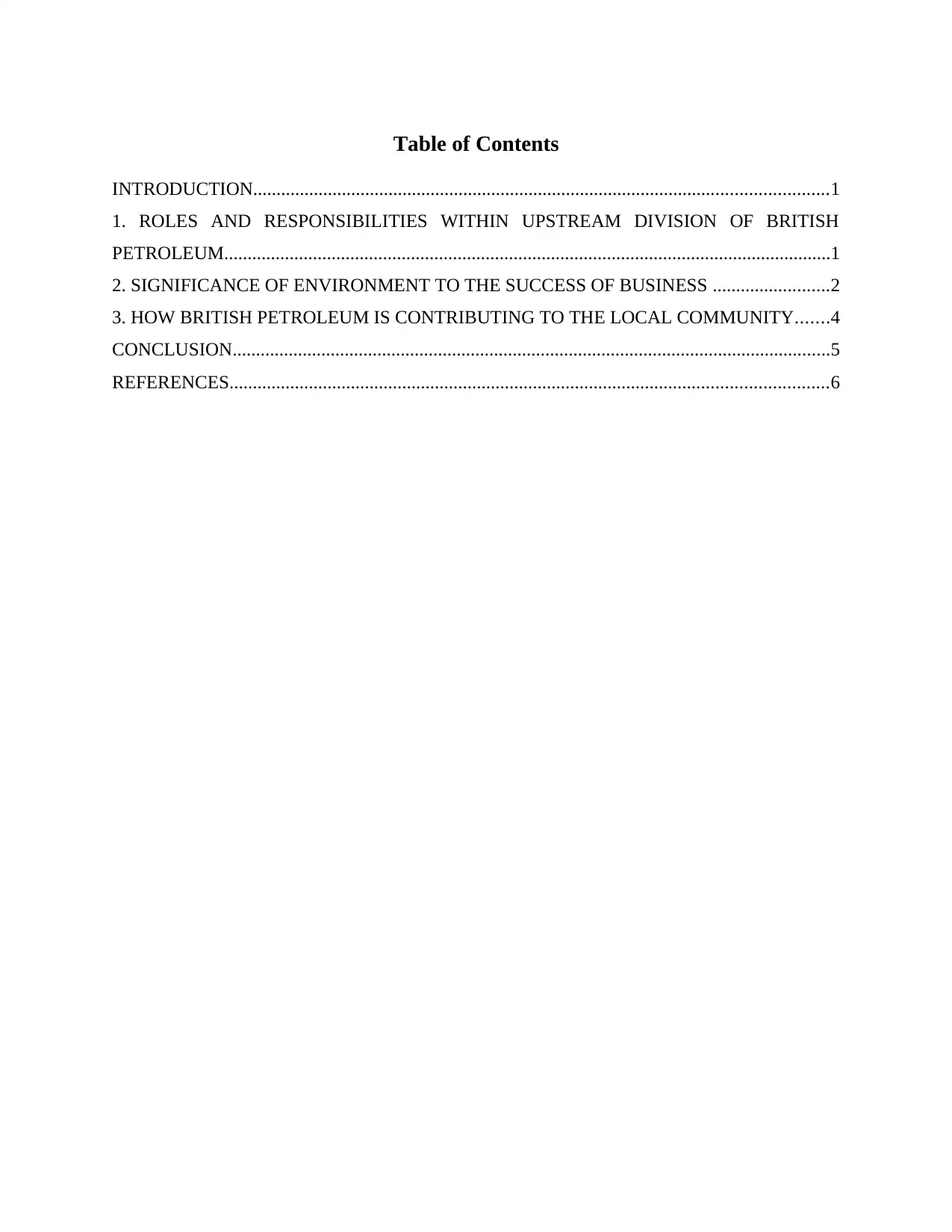
Table of Contents
INTRODUCTION...........................................................................................................................1
1. ROLES AND RESPONSIBILITIES WITHIN UPSTREAM DIVISION OF BRITISH
PETROLEUM..................................................................................................................................1
2. SIGNIFICANCE OF ENVIRONMENT TO THE SUCCESS OF BUSINESS .........................2
3. HOW BRITISH PETROLEUM IS CONTRIBUTING TO THE LOCAL COMMUNITY.......4
CONCLUSION................................................................................................................................5
REFERENCES................................................................................................................................6
INTRODUCTION...........................................................................................................................1
1. ROLES AND RESPONSIBILITIES WITHIN UPSTREAM DIVISION OF BRITISH
PETROLEUM..................................................................................................................................1
2. SIGNIFICANCE OF ENVIRONMENT TO THE SUCCESS OF BUSINESS .........................2
3. HOW BRITISH PETROLEUM IS CONTRIBUTING TO THE LOCAL COMMUNITY.......4
CONCLUSION................................................................................................................................5
REFERENCES................................................................................................................................6
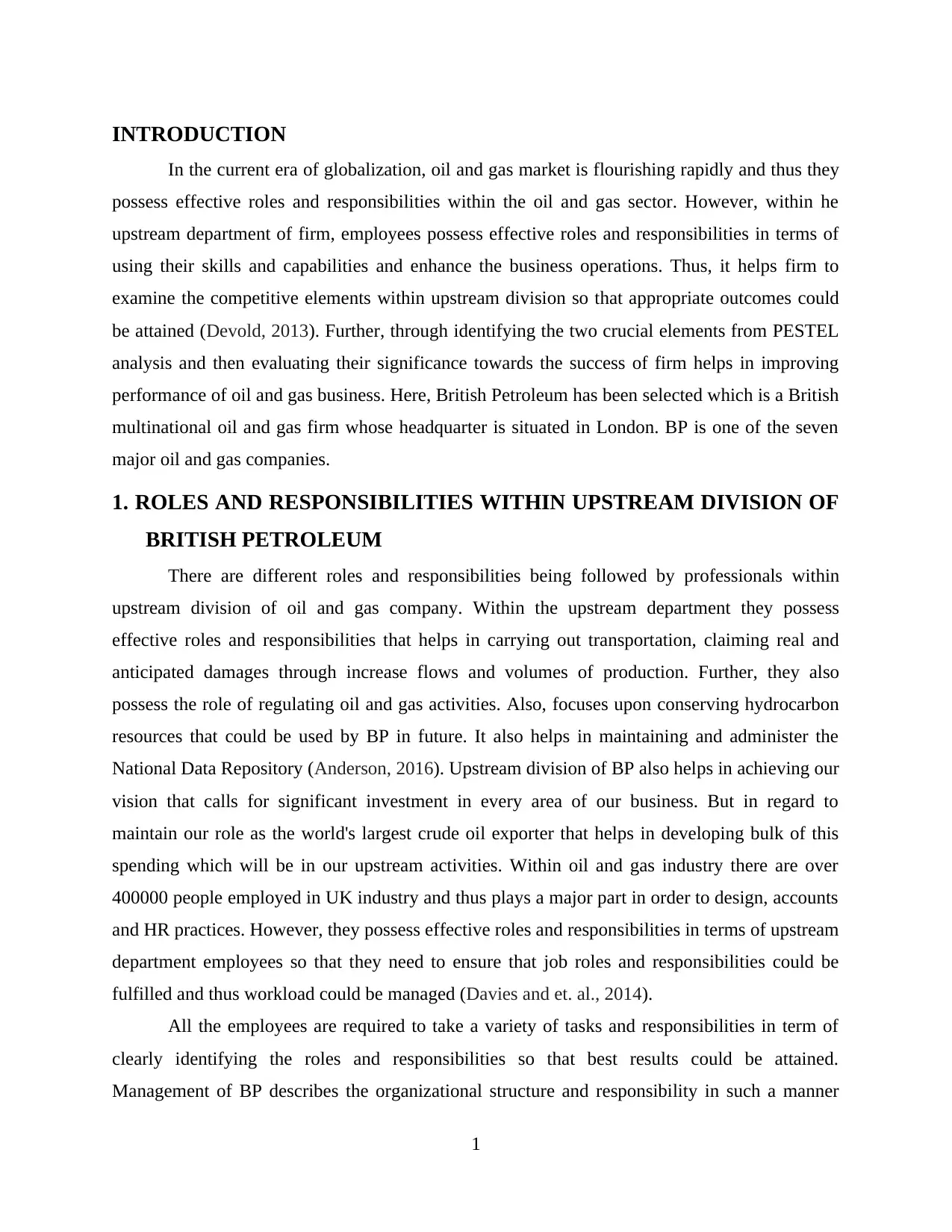
INTRODUCTION
In the current era of globalization, oil and gas market is flourishing rapidly and thus they
possess effective roles and responsibilities within the oil and gas sector. However, within he
upstream department of firm, employees possess effective roles and responsibilities in terms of
using their skills and capabilities and enhance the business operations. Thus, it helps firm to
examine the competitive elements within upstream division so that appropriate outcomes could
be attained (Devold, 2013). Further, through identifying the two crucial elements from PESTEL
analysis and then evaluating their significance towards the success of firm helps in improving
performance of oil and gas business. Here, British Petroleum has been selected which is a British
multinational oil and gas firm whose headquarter is situated in London. BP is one of the seven
major oil and gas companies.
1. ROLES AND RESPONSIBILITIES WITHIN UPSTREAM DIVISION OF
BRITISH PETROLEUM
There are different roles and responsibilities being followed by professionals within
upstream division of oil and gas company. Within the upstream department they possess
effective roles and responsibilities that helps in carrying out transportation, claiming real and
anticipated damages through increase flows and volumes of production. Further, they also
possess the role of regulating oil and gas activities. Also, focuses upon conserving hydrocarbon
resources that could be used by BP in future. It also helps in maintaining and administer the
National Data Repository (Anderson, 2016). Upstream division of BP also helps in achieving our
vision that calls for significant investment in every area of our business. But in regard to
maintain our role as the world's largest crude oil exporter that helps in developing bulk of this
spending which will be in our upstream activities. Within oil and gas industry there are over
400000 people employed in UK industry and thus plays a major part in order to design, accounts
and HR practices. However, they possess effective roles and responsibilities in terms of upstream
department employees so that they need to ensure that job roles and responsibilities could be
fulfilled and thus workload could be managed (Davies and et. al., 2014).
All the employees are required to take a variety of tasks and responsibilities in term of
clearly identifying the roles and responsibilities so that best results could be attained.
Management of BP describes the organizational structure and responsibility in such a manner
1
In the current era of globalization, oil and gas market is flourishing rapidly and thus they
possess effective roles and responsibilities within the oil and gas sector. However, within he
upstream department of firm, employees possess effective roles and responsibilities in terms of
using their skills and capabilities and enhance the business operations. Thus, it helps firm to
examine the competitive elements within upstream division so that appropriate outcomes could
be attained (Devold, 2013). Further, through identifying the two crucial elements from PESTEL
analysis and then evaluating their significance towards the success of firm helps in improving
performance of oil and gas business. Here, British Petroleum has been selected which is a British
multinational oil and gas firm whose headquarter is situated in London. BP is one of the seven
major oil and gas companies.
1. ROLES AND RESPONSIBILITIES WITHIN UPSTREAM DIVISION OF
BRITISH PETROLEUM
There are different roles and responsibilities being followed by professionals within
upstream division of oil and gas company. Within the upstream department they possess
effective roles and responsibilities that helps in carrying out transportation, claiming real and
anticipated damages through increase flows and volumes of production. Further, they also
possess the role of regulating oil and gas activities. Also, focuses upon conserving hydrocarbon
resources that could be used by BP in future. It also helps in maintaining and administer the
National Data Repository (Anderson, 2016). Upstream division of BP also helps in achieving our
vision that calls for significant investment in every area of our business. But in regard to
maintain our role as the world's largest crude oil exporter that helps in developing bulk of this
spending which will be in our upstream activities. Within oil and gas industry there are over
400000 people employed in UK industry and thus plays a major part in order to design, accounts
and HR practices. However, they possess effective roles and responsibilities in terms of upstream
department employees so that they need to ensure that job roles and responsibilities could be
fulfilled and thus workload could be managed (Davies and et. al., 2014).
All the employees are required to take a variety of tasks and responsibilities in term of
clearly identifying the roles and responsibilities so that best results could be attained.
Management of BP describes the organizational structure and responsibility in such a manner
1
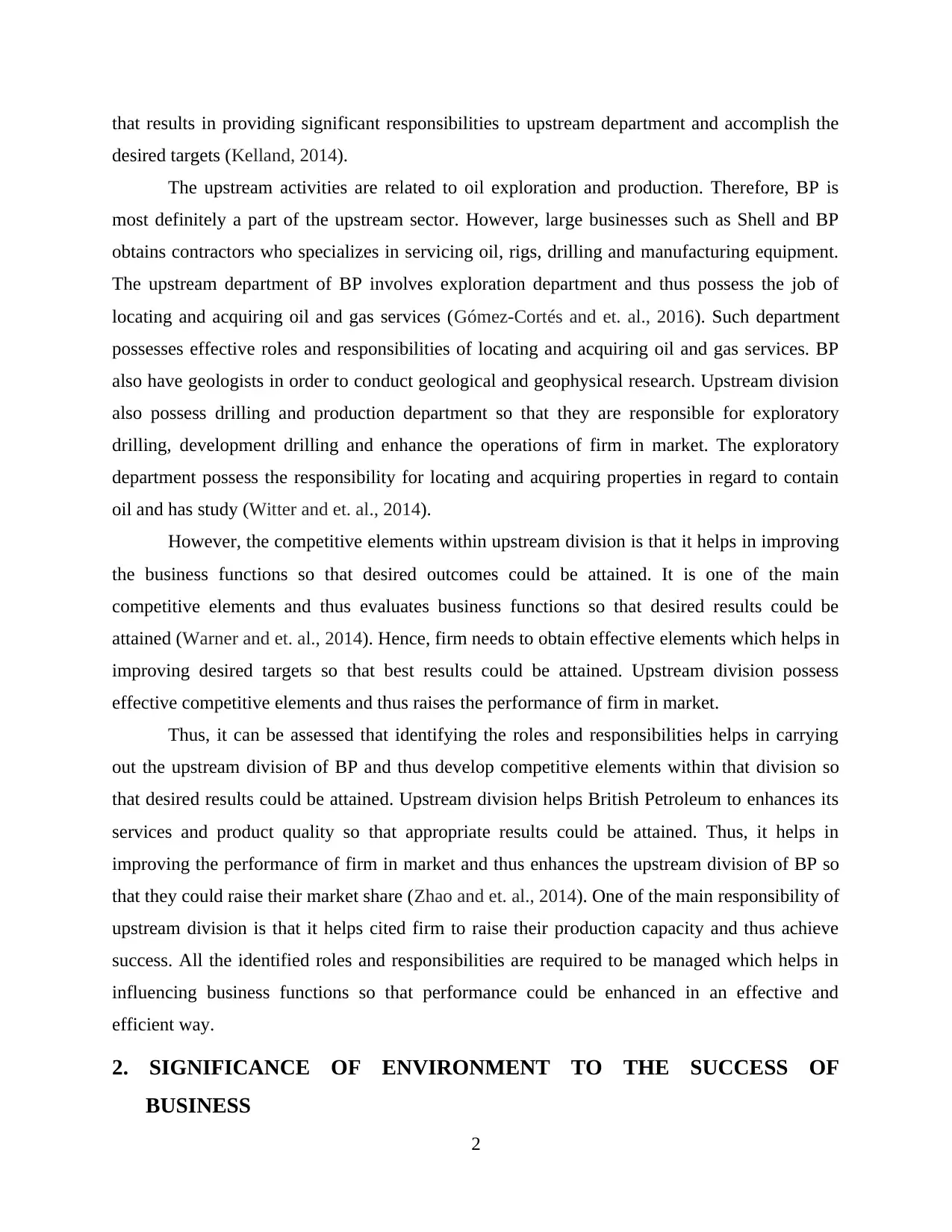
that results in providing significant responsibilities to upstream department and accomplish the
desired targets (Kelland, 2014).
The upstream activities are related to oil exploration and production. Therefore, BP is
most definitely a part of the upstream sector. However, large businesses such as Shell and BP
obtains contractors who specializes in servicing oil, rigs, drilling and manufacturing equipment.
The upstream department of BP involves exploration department and thus possess the job of
locating and acquiring oil and gas services (Gómez-Cortés and et. al., 2016). Such department
possesses effective roles and responsibilities of locating and acquiring oil and gas services. BP
also have geologists in order to conduct geological and geophysical research. Upstream division
also possess drilling and production department so that they are responsible for exploratory
drilling, development drilling and enhance the operations of firm in market. The exploratory
department possess the responsibility for locating and acquiring properties in regard to contain
oil and has study (Witter and et. al., 2014).
However, the competitive elements within upstream division is that it helps in improving
the business functions so that desired outcomes could be attained. It is one of the main
competitive elements and thus evaluates business functions so that desired results could be
attained (Warner and et. al., 2014). Hence, firm needs to obtain effective elements which helps in
improving desired targets so that best results could be attained. Upstream division possess
effective competitive elements and thus raises the performance of firm in market.
Thus, it can be assessed that identifying the roles and responsibilities helps in carrying
out the upstream division of BP and thus develop competitive elements within that division so
that desired results could be attained. Upstream division helps British Petroleum to enhances its
services and product quality so that appropriate results could be attained. Thus, it helps in
improving the performance of firm in market and thus enhances the upstream division of BP so
that they could raise their market share (Zhao and et. al., 2014). One of the main responsibility of
upstream division is that it helps cited firm to raise their production capacity and thus achieve
success. All the identified roles and responsibilities are required to be managed which helps in
influencing business functions so that performance could be enhanced in an effective and
efficient way.
2. SIGNIFICANCE OF ENVIRONMENT TO THE SUCCESS OF
BUSINESS
2
desired targets (Kelland, 2014).
The upstream activities are related to oil exploration and production. Therefore, BP is
most definitely a part of the upstream sector. However, large businesses such as Shell and BP
obtains contractors who specializes in servicing oil, rigs, drilling and manufacturing equipment.
The upstream department of BP involves exploration department and thus possess the job of
locating and acquiring oil and gas services (Gómez-Cortés and et. al., 2016). Such department
possesses effective roles and responsibilities of locating and acquiring oil and gas services. BP
also have geologists in order to conduct geological and geophysical research. Upstream division
also possess drilling and production department so that they are responsible for exploratory
drilling, development drilling and enhance the operations of firm in market. The exploratory
department possess the responsibility for locating and acquiring properties in regard to contain
oil and has study (Witter and et. al., 2014).
However, the competitive elements within upstream division is that it helps in improving
the business functions so that desired outcomes could be attained. It is one of the main
competitive elements and thus evaluates business functions so that desired results could be
attained (Warner and et. al., 2014). Hence, firm needs to obtain effective elements which helps in
improving desired targets so that best results could be attained. Upstream division possess
effective competitive elements and thus raises the performance of firm in market.
Thus, it can be assessed that identifying the roles and responsibilities helps in carrying
out the upstream division of BP and thus develop competitive elements within that division so
that desired results could be attained. Upstream division helps British Petroleum to enhances its
services and product quality so that appropriate results could be attained. Thus, it helps in
improving the performance of firm in market and thus enhances the upstream division of BP so
that they could raise their market share (Zhao and et. al., 2014). One of the main responsibility of
upstream division is that it helps cited firm to raise their production capacity and thus achieve
success. All the identified roles and responsibilities are required to be managed which helps in
influencing business functions so that performance could be enhanced in an effective and
efficient way.
2. SIGNIFICANCE OF ENVIRONMENT TO THE SUCCESS OF
BUSINESS
2
Secure Best Marks with AI Grader
Need help grading? Try our AI Grader for instant feedback on your assignments.
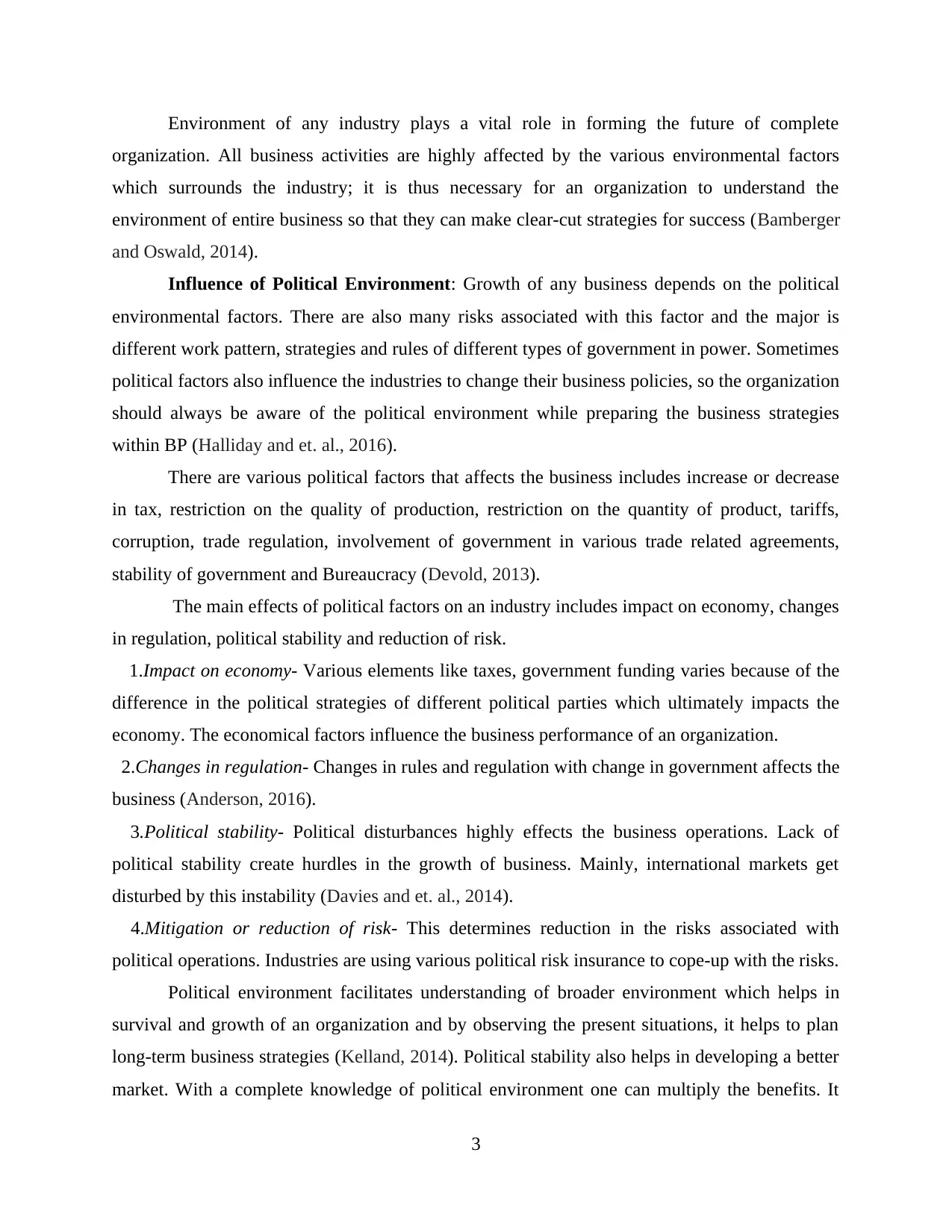
Environment of any industry plays a vital role in forming the future of complete
organization. All business activities are highly affected by the various environmental factors
which surrounds the industry; it is thus necessary for an organization to understand the
environment of entire business so that they can make clear-cut strategies for success (Bamberger
and Oswald, 2014).
Influence of Political Environment: Growth of any business depends on the political
environmental factors. There are also many risks associated with this factor and the major is
different work pattern, strategies and rules of different types of government in power. Sometimes
political factors also influence the industries to change their business policies, so the organization
should always be aware of the political environment while preparing the business strategies
within BP (Halliday and et. al., 2016).
There are various political factors that affects the business includes increase or decrease
in tax, restriction on the quality of production, restriction on the quantity of product, tariffs,
corruption, trade regulation, involvement of government in various trade related agreements,
stability of government and Bureaucracy (Devold, 2013).
The main effects of political factors on an industry includes impact on economy, changes
in regulation, political stability and reduction of risk.
1.Impact on economy- Various elements like taxes, government funding varies because of the
difference in the political strategies of different political parties which ultimately impacts the
economy. The economical factors influence the business performance of an organization.
2.Changes in regulation- Changes in rules and regulation with change in government affects the
business (Anderson, 2016).
3.Political stability- Political disturbances highly effects the business operations. Lack of
political stability create hurdles in the growth of business. Mainly, international markets get
disturbed by this instability (Davies and et. al., 2014).
4.Mitigation or reduction of risk- This determines reduction in the risks associated with
political operations. Industries are using various political risk insurance to cope-up with the risks.
Political environment facilitates understanding of broader environment which helps in
survival and growth of an organization and by observing the present situations, it helps to plan
long-term business strategies (Kelland, 2014). Political stability also helps in developing a better
market. With a complete knowledge of political environment one can multiply the benefits. It
3
organization. All business activities are highly affected by the various environmental factors
which surrounds the industry; it is thus necessary for an organization to understand the
environment of entire business so that they can make clear-cut strategies for success (Bamberger
and Oswald, 2014).
Influence of Political Environment: Growth of any business depends on the political
environmental factors. There are also many risks associated with this factor and the major is
different work pattern, strategies and rules of different types of government in power. Sometimes
political factors also influence the industries to change their business policies, so the organization
should always be aware of the political environment while preparing the business strategies
within BP (Halliday and et. al., 2016).
There are various political factors that affects the business includes increase or decrease
in tax, restriction on the quality of production, restriction on the quantity of product, tariffs,
corruption, trade regulation, involvement of government in various trade related agreements,
stability of government and Bureaucracy (Devold, 2013).
The main effects of political factors on an industry includes impact on economy, changes
in regulation, political stability and reduction of risk.
1.Impact on economy- Various elements like taxes, government funding varies because of the
difference in the political strategies of different political parties which ultimately impacts the
economy. The economical factors influence the business performance of an organization.
2.Changes in regulation- Changes in rules and regulation with change in government affects the
business (Anderson, 2016).
3.Political stability- Political disturbances highly effects the business operations. Lack of
political stability create hurdles in the growth of business. Mainly, international markets get
disturbed by this instability (Davies and et. al., 2014).
4.Mitigation or reduction of risk- This determines reduction in the risks associated with
political operations. Industries are using various political risk insurance to cope-up with the risks.
Political environment facilitates understanding of broader environment which helps in
survival and growth of an organization and by observing the present situations, it helps to plan
long-term business strategies (Kelland, 2014). Political stability also helps in developing a better
market. With a complete knowledge of political environment one can multiply the benefits. It
3
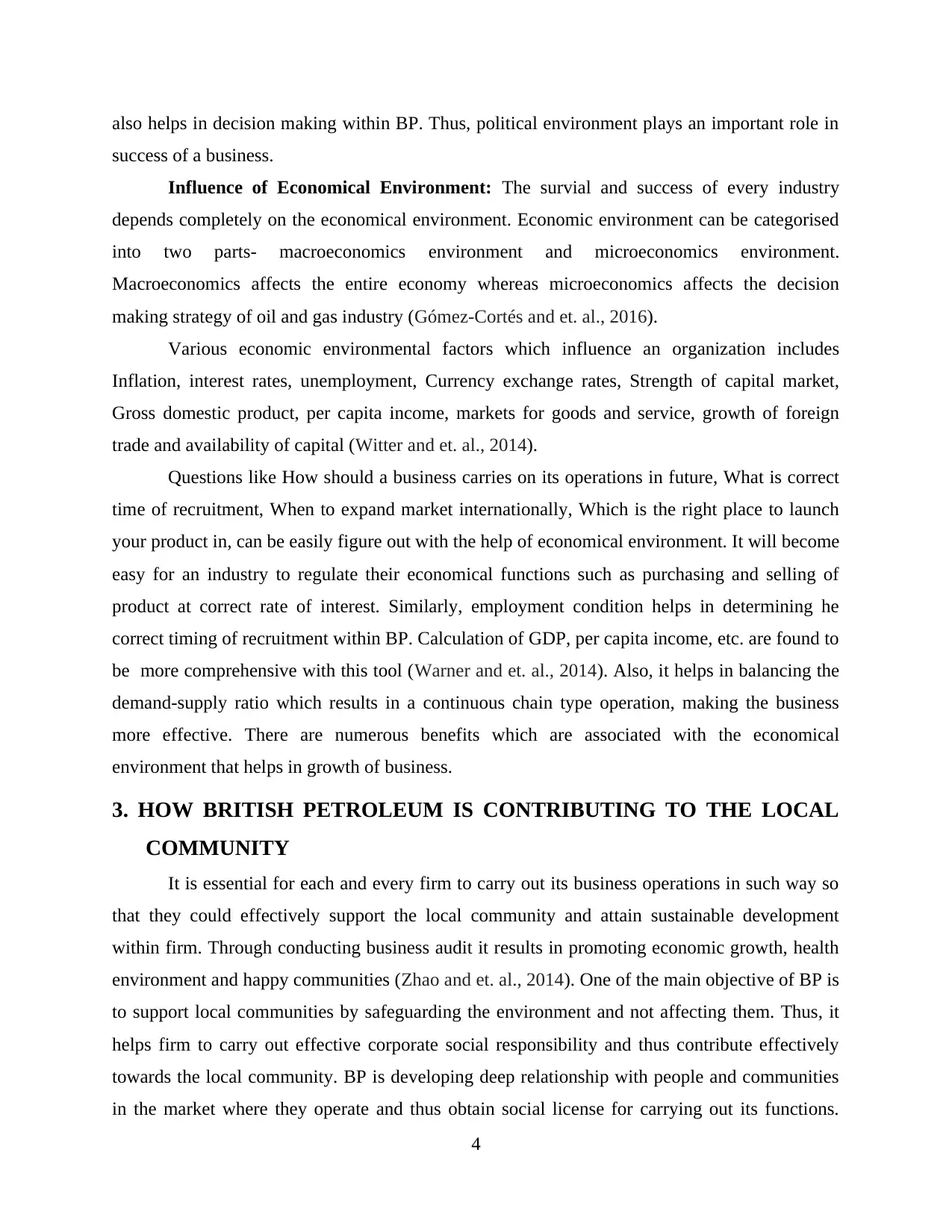
also helps in decision making within BP. Thus, political environment plays an important role in
success of a business.
Influence of Economical Environment: The survial and success of every industry
depends completely on the economical environment. Economic environment can be categorised
into two parts- macroeconomics environment and microeconomics environment.
Macroeconomics affects the entire economy whereas microeconomics affects the decision
making strategy of oil and gas industry (Gómez-Cortés and et. al., 2016).
Various economic environmental factors which influence an organization includes
Inflation, interest rates, unemployment, Currency exchange rates, Strength of capital market,
Gross domestic product, per capita income, markets for goods and service, growth of foreign
trade and availability of capital (Witter and et. al., 2014).
Questions like How should a business carries on its operations in future, What is correct
time of recruitment, When to expand market internationally, Which is the right place to launch
your product in, can be easily figure out with the help of economical environment. It will become
easy for an industry to regulate their economical functions such as purchasing and selling of
product at correct rate of interest. Similarly, employment condition helps in determining he
correct timing of recruitment within BP. Calculation of GDP, per capita income, etc. are found to
be more comprehensive with this tool (Warner and et. al., 2014). Also, it helps in balancing the
demand-supply ratio which results in a continuous chain type operation, making the business
more effective. There are numerous benefits which are associated with the economical
environment that helps in growth of business.
3. HOW BRITISH PETROLEUM IS CONTRIBUTING TO THE LOCAL
COMMUNITY
It is essential for each and every firm to carry out its business operations in such way so
that they could effectively support the local community and attain sustainable development
within firm. Through conducting business audit it results in promoting economic growth, health
environment and happy communities (Zhao and et. al., 2014). One of the main objective of BP is
to support local communities by safeguarding the environment and not affecting them. Thus, it
helps firm to carry out effective corporate social responsibility and thus contribute effectively
towards the local community. BP is developing deep relationship with people and communities
in the market where they operate and thus obtain social license for carrying out its functions.
4
success of a business.
Influence of Economical Environment: The survial and success of every industry
depends completely on the economical environment. Economic environment can be categorised
into two parts- macroeconomics environment and microeconomics environment.
Macroeconomics affects the entire economy whereas microeconomics affects the decision
making strategy of oil and gas industry (Gómez-Cortés and et. al., 2016).
Various economic environmental factors which influence an organization includes
Inflation, interest rates, unemployment, Currency exchange rates, Strength of capital market,
Gross domestic product, per capita income, markets for goods and service, growth of foreign
trade and availability of capital (Witter and et. al., 2014).
Questions like How should a business carries on its operations in future, What is correct
time of recruitment, When to expand market internationally, Which is the right place to launch
your product in, can be easily figure out with the help of economical environment. It will become
easy for an industry to regulate their economical functions such as purchasing and selling of
product at correct rate of interest. Similarly, employment condition helps in determining he
correct timing of recruitment within BP. Calculation of GDP, per capita income, etc. are found to
be more comprehensive with this tool (Warner and et. al., 2014). Also, it helps in balancing the
demand-supply ratio which results in a continuous chain type operation, making the business
more effective. There are numerous benefits which are associated with the economical
environment that helps in growth of business.
3. HOW BRITISH PETROLEUM IS CONTRIBUTING TO THE LOCAL
COMMUNITY
It is essential for each and every firm to carry out its business operations in such way so
that they could effectively support the local community and attain sustainable development
within firm. Through conducting business audit it results in promoting economic growth, health
environment and happy communities (Zhao and et. al., 2014). One of the main objective of BP is
to support local communities by safeguarding the environment and not affecting them. Thus, it
helps firm to carry out effective corporate social responsibility and thus contribute effectively
towards the local community. BP is developing deep relationship with people and communities
in the market where they operate and thus obtain social license for carrying out its functions.
4
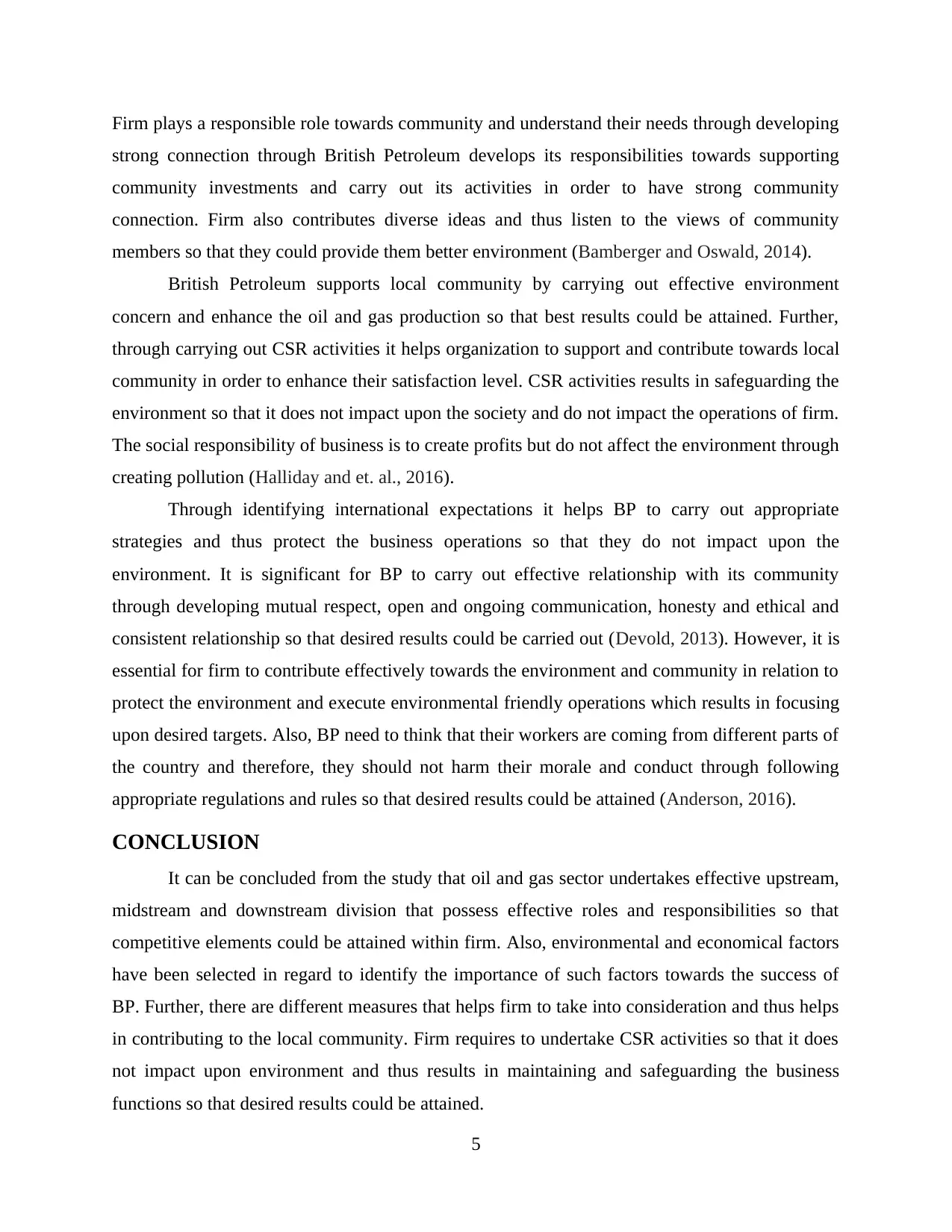
Firm plays a responsible role towards community and understand their needs through developing
strong connection through British Petroleum develops its responsibilities towards supporting
community investments and carry out its activities in order to have strong community
connection. Firm also contributes diverse ideas and thus listen to the views of community
members so that they could provide them better environment (Bamberger and Oswald, 2014).
British Petroleum supports local community by carrying out effective environment
concern and enhance the oil and gas production so that best results could be attained. Further,
through carrying out CSR activities it helps organization to support and contribute towards local
community in order to enhance their satisfaction level. CSR activities results in safeguarding the
environment so that it does not impact upon the society and do not impact the operations of firm.
The social responsibility of business is to create profits but do not affect the environment through
creating pollution (Halliday and et. al., 2016).
Through identifying international expectations it helps BP to carry out appropriate
strategies and thus protect the business operations so that they do not impact upon the
environment. It is significant for BP to carry out effective relationship with its community
through developing mutual respect, open and ongoing communication, honesty and ethical and
consistent relationship so that desired results could be carried out (Devold, 2013). However, it is
essential for firm to contribute effectively towards the environment and community in relation to
protect the environment and execute environmental friendly operations which results in focusing
upon desired targets. Also, BP need to think that their workers are coming from different parts of
the country and therefore, they should not harm their morale and conduct through following
appropriate regulations and rules so that desired results could be attained (Anderson, 2016).
CONCLUSION
It can be concluded from the study that oil and gas sector undertakes effective upstream,
midstream and downstream division that possess effective roles and responsibilities so that
competitive elements could be attained within firm. Also, environmental and economical factors
have been selected in regard to identify the importance of such factors towards the success of
BP. Further, there are different measures that helps firm to take into consideration and thus helps
in contributing to the local community. Firm requires to undertake CSR activities so that it does
not impact upon environment and thus results in maintaining and safeguarding the business
functions so that desired results could be attained.
5
strong connection through British Petroleum develops its responsibilities towards supporting
community investments and carry out its activities in order to have strong community
connection. Firm also contributes diverse ideas and thus listen to the views of community
members so that they could provide them better environment (Bamberger and Oswald, 2014).
British Petroleum supports local community by carrying out effective environment
concern and enhance the oil and gas production so that best results could be attained. Further,
through carrying out CSR activities it helps organization to support and contribute towards local
community in order to enhance their satisfaction level. CSR activities results in safeguarding the
environment so that it does not impact upon the society and do not impact the operations of firm.
The social responsibility of business is to create profits but do not affect the environment through
creating pollution (Halliday and et. al., 2016).
Through identifying international expectations it helps BP to carry out appropriate
strategies and thus protect the business operations so that they do not impact upon the
environment. It is significant for BP to carry out effective relationship with its community
through developing mutual respect, open and ongoing communication, honesty and ethical and
consistent relationship so that desired results could be carried out (Devold, 2013). However, it is
essential for firm to contribute effectively towards the environment and community in relation to
protect the environment and execute environmental friendly operations which results in focusing
upon desired targets. Also, BP need to think that their workers are coming from different parts of
the country and therefore, they should not harm their morale and conduct through following
appropriate regulations and rules so that desired results could be attained (Anderson, 2016).
CONCLUSION
It can be concluded from the study that oil and gas sector undertakes effective upstream,
midstream and downstream division that possess effective roles and responsibilities so that
competitive elements could be attained within firm. Also, environmental and economical factors
have been selected in regard to identify the importance of such factors towards the success of
BP. Further, there are different measures that helps firm to take into consideration and thus helps
in contributing to the local community. Firm requires to undertake CSR activities so that it does
not impact upon environment and thus results in maintaining and safeguarding the business
functions so that desired results could be attained.
5
Paraphrase This Document
Need a fresh take? Get an instant paraphrase of this document with our AI Paraphraser
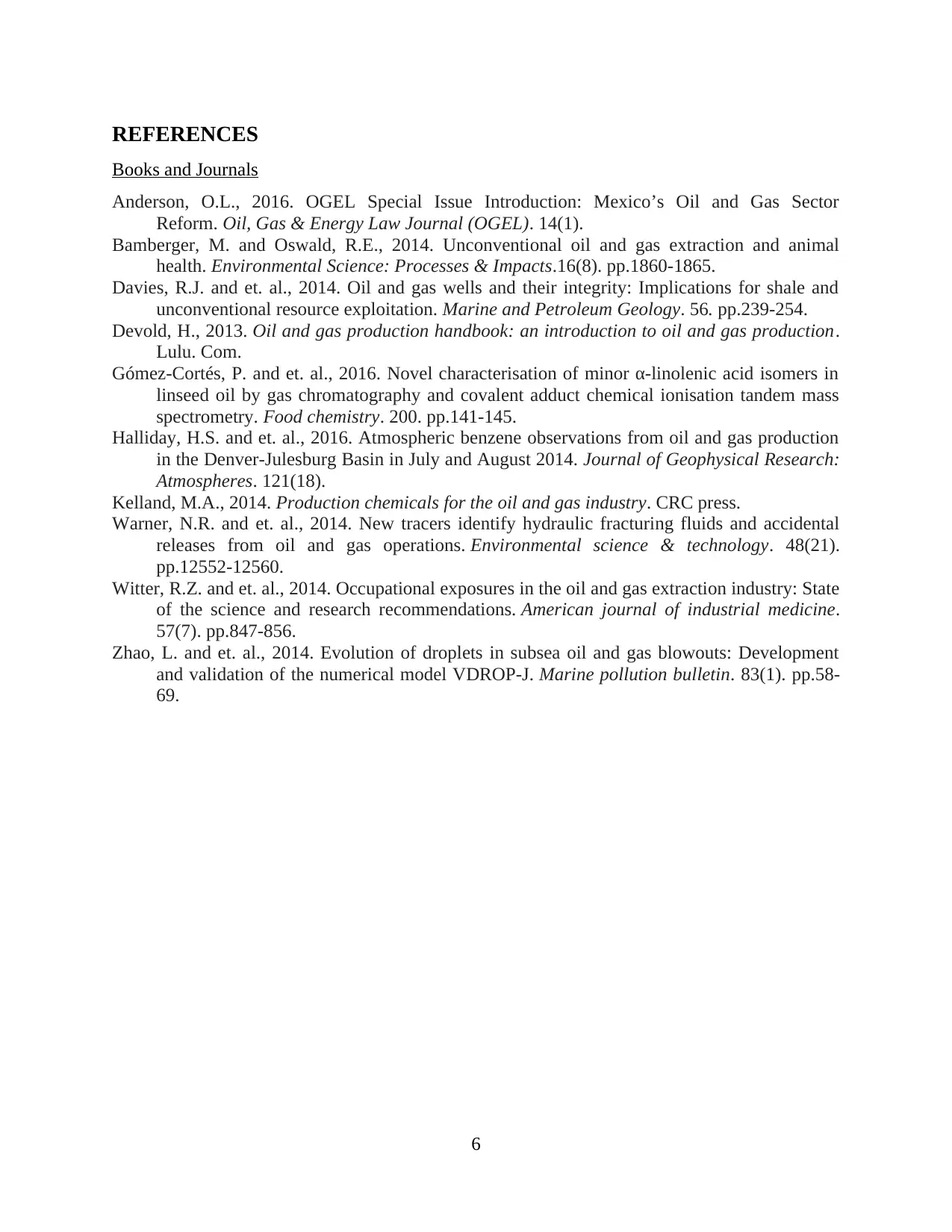
REFERENCES
Books and Journals
Anderson, O.L., 2016. OGEL Special Issue Introduction: Mexico’s Oil and Gas Sector
Reform. Oil, Gas & Energy Law Journal (OGEL). 14(1).
Bamberger, M. and Oswald, R.E., 2014. Unconventional oil and gas extraction and animal
health. Environmental Science: Processes & Impacts.16(8). pp.1860-1865.
Davies, R.J. and et. al., 2014. Oil and gas wells and their integrity: Implications for shale and
unconventional resource exploitation. Marine and Petroleum Geology. 56. pp.239-254.
Devold, H., 2013. Oil and gas production handbook: an introduction to oil and gas production.
Lulu. Com.
Gómez-Cortés, P. and et. al., 2016. Novel characterisation of minor α-linolenic acid isomers in
linseed oil by gas chromatography and covalent adduct chemical ionisation tandem mass
spectrometry. Food chemistry. 200. pp.141-145.
Halliday, H.S. and et. al., 2016. Atmospheric benzene observations from oil and gas production
in the Denver‐Julesburg Basin in July and August 2014. Journal of Geophysical Research:
Atmospheres. 121(18).
Kelland, M.A., 2014. Production chemicals for the oil and gas industry. CRC press.
Warner, N.R. and et. al., 2014. New tracers identify hydraulic fracturing fluids and accidental
releases from oil and gas operations. Environmental science & technology. 48(21).
pp.12552-12560.
Witter, R.Z. and et. al., 2014. Occupational exposures in the oil and gas extraction industry: State
of the science and research recommendations. American journal of industrial medicine.
57(7). pp.847-856.
Zhao, L. and et. al., 2014. Evolution of droplets in subsea oil and gas blowouts: Development
and validation of the numerical model VDROP-J. Marine pollution bulletin. 83(1). pp.58-
69.
6
Books and Journals
Anderson, O.L., 2016. OGEL Special Issue Introduction: Mexico’s Oil and Gas Sector
Reform. Oil, Gas & Energy Law Journal (OGEL). 14(1).
Bamberger, M. and Oswald, R.E., 2014. Unconventional oil and gas extraction and animal
health. Environmental Science: Processes & Impacts.16(8). pp.1860-1865.
Davies, R.J. and et. al., 2014. Oil and gas wells and their integrity: Implications for shale and
unconventional resource exploitation. Marine and Petroleum Geology. 56. pp.239-254.
Devold, H., 2013. Oil and gas production handbook: an introduction to oil and gas production.
Lulu. Com.
Gómez-Cortés, P. and et. al., 2016. Novel characterisation of minor α-linolenic acid isomers in
linseed oil by gas chromatography and covalent adduct chemical ionisation tandem mass
spectrometry. Food chemistry. 200. pp.141-145.
Halliday, H.S. and et. al., 2016. Atmospheric benzene observations from oil and gas production
in the Denver‐Julesburg Basin in July and August 2014. Journal of Geophysical Research:
Atmospheres. 121(18).
Kelland, M.A., 2014. Production chemicals for the oil and gas industry. CRC press.
Warner, N.R. and et. al., 2014. New tracers identify hydraulic fracturing fluids and accidental
releases from oil and gas operations. Environmental science & technology. 48(21).
pp.12552-12560.
Witter, R.Z. and et. al., 2014. Occupational exposures in the oil and gas extraction industry: State
of the science and research recommendations. American journal of industrial medicine.
57(7). pp.847-856.
Zhao, L. and et. al., 2014. Evolution of droplets in subsea oil and gas blowouts: Development
and validation of the numerical model VDROP-J. Marine pollution bulletin. 83(1). pp.58-
69.
6
1 out of 8
Related Documents
Your All-in-One AI-Powered Toolkit for Academic Success.
+13062052269
info@desklib.com
Available 24*7 on WhatsApp / Email
![[object Object]](/_next/static/media/star-bottom.7253800d.svg)
Unlock your academic potential
© 2024 | Zucol Services PVT LTD | All rights reserved.





